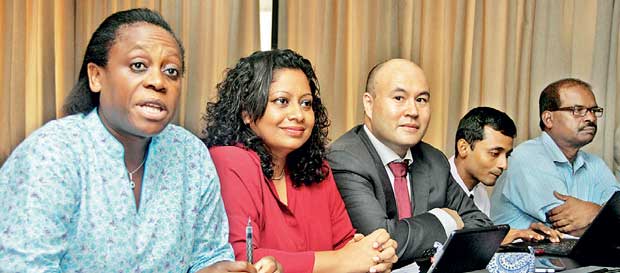30 Jun 2017 - {{hitsCtrl.values.hits}}
 From left: World Bank Sri Lanka Country Director Idah Pswarayi-Riddihough, World Bank Sri Lanka External and Corporate Relations Lead Dilinika Peiris, World Bank Sri Lanka Senior Country Economist Ralph van Doorn and World Bank Sri Lanka Economist Kishan Abeygunawardana
From left: World Bank Sri Lanka Country Director Idah Pswarayi-Riddihough, World Bank Sri Lanka External and Corporate Relations Lead Dilinika Peiris, World Bank Sri Lanka Senior Country Economist Ralph van Doorn and World Bank Sri Lanka Economist Kishan Abeygunawardana
Pic by Pradeep Dilrukshan
By Chandeepa Wettasinghe
The World Bank is expecting Sri Lanka’s budget deficit to run up to 5.2 percent of the Gross Domestic Product (GDP) this year compared to the more ambitious 4.7 percent of GDP projection of the government, although the development lender placed its faith in Sri Lanka achieving its long-term deficit targets.
“We think that the fiscal deficit will continue to narrow, to 5.2 percent of GDP in 2017 thanks to revenue improvements; for example the VAT implementation for the first full year,” World Bank Sri Lanka Senior Country Economist Ralph van Doorn said. Sri Lanka’s budget deficit for 2016 was 5.4 percent of GDP, improving from a 7.4 percent of GDP deficit in 2015.
van Doorn said that he cannot specify exactly where the World Bank’s projections differ from the government’s. “It’s difficult to say, because we also have different GDP projections. We can’t really compare each of these numbers. There are both numerator and denominator differences. It’s not easy to look side-by-side,” he said. According to the World Bank, Sri Lanka’s GDP will grow by 4.7 percent this year without taking into account the effects from successive natural disasters.
The Central Bank on the other hand revised its growth target down to 4.5-5 percent after accounting for the natural disasters, down from 5-5.5 percent growth projections earlier.
van Doorn said that the World Bank’s budget deficit is also higher than the government’s because it has taken the execution of budget proposals into consideration, in addition to the World Bank’s own views.
“We have our own projections. We look at the numbers and the plans and our own ideas. The budget speech was in November, we looked at the execution of the budget and we looked at certain trends, which were likely to go on,” he said.
Despite van Doorn’s reluctance to pinpoint where the fiscal indiscipline would arise from, he said that the government’s target of a primary account surplus—the difference between revenue and recurrent expenditure—could be achieved this year. This would translate into the budget deficit being driven by capital expenditure.
However, despite the projection of a short-term hiccup, the World Bank is expecting the deficit target for 2020 to be met. “We think that the government is able to reach the 3.5 percent of GDP deficit by 2020. We may have slightly different projections from the government but that’s okay, what matters is the target of 3.5 percent of GDP by 2020,” van Doorn said.
The 2020 deficit target is the ‘linchpin’ of the International Monetary Fund’s US$ 1.5 billion Extended Fund Facility. van Doorn also said that the direction of policy reforms is also very important, and praised the draft Inland Revenue Act, which makes the tax system simpler, allowing to generate more tax revenue after it comes into force.
The draft Inland Revenue Bill drew praise from the World Bank for its attempts to create a simple tax system and encourage investment.
“It looks like a much simpler Act than it used to be. It’s easier for businesses to file taxes and comply with the tax law,” van Doorn said.
Just 7 percent of the labour force and 7 percent of companies in Sri Lanka pay taxes, he pointed out.
According to van Doorn, the new Inland Revenue Bill also promotes investments, instead of promises of investment.
“The previous incentive regime gave tax holidays upfront in return for promise to invest. We saw in some cases where the investors didn’t invest as much as it was promised, so the incentive was to make profits while they invested.
The incentive regime under the new Inland Revenue legislation is going to reward investment only if you invest,” he said.
He said that after companies invest and file their taxes, they can claim refunds according to their investment.
“I think it’s a big step forward,” van Doorn said.
He noted that coupled with the government’s announced plans to improve doing business in Sri Lanka, and plans to phase out para-tariffs in the tradable sector, the new investment regime in the bill will spur investments into the export sector.
26 Nov 2024 23 minute ago
26 Nov 2024 25 minute ago
26 Nov 2024 29 minute ago
26 Nov 2024 1 hours ago
26 Nov 2024 3 hours ago